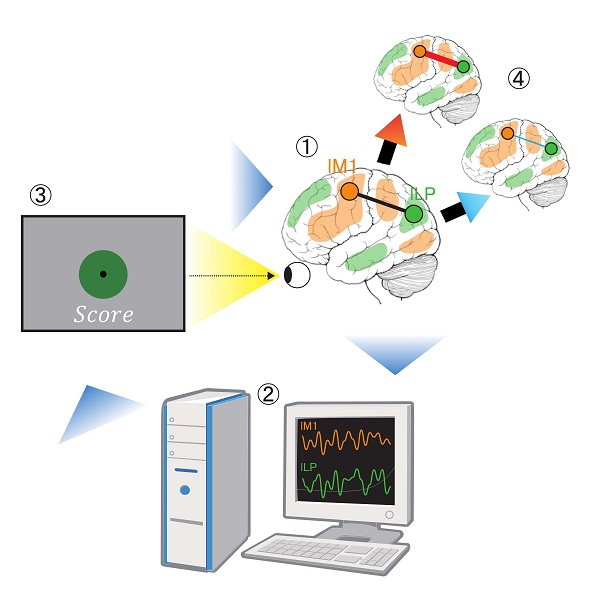Maintaining brain networks Training enables changes in neural connections, cognitive functions


Illustration depicting training method for changing neural connection and cognitive functions
Researchers used a device to monitor fluctuations in brain activity in real time (figure 1), and analyzed similarity in activity fluctuations (temporal correlation) between two brain regions, lM1 and lLP (figure 2). They informed participants of the correlation as a score represented by a green circle and its size (figure 3), and repeated the procedure many times. As a result, the correlation increased or decreased depending on the experimental setting (figure 4).
© 2017 Ayumu Yamashita.
Researchers at the University of Tokyo and their collaborators developed a method for changing the connections between different brain regions and modifying a person's cognitive functions. The current results hold promise of leading to the development of methods to restore impaired cognitive functions by normalizing these connections.
The brain's numerous regions constitute a huge network connected by fibers. This network mediates cognitive functions such as memory and attention. Changes in these connections caused by aging or brain disease have been shown to interfere with the transmission of information between brain regions and impair cognitive functions. Functional magnetic resonance imaging (fMRI), used to measure brain activity, enables us to analyze similarities in the fluctuation of activity related to time—the temporal correlation in brain activity—between brain regions, and to estimate how the regions are connected. Through such analysis, researchers have found either an overly pronounced increase or decrease in temporal correlations at particular connections, and that abnormal connections often impair cognitive functions in the elderly and patients with brain disease. Scientists figure that normalizing the excessive increase or decrease in temporal correlations would help recover cognitive functions; however, as the methods used until now, including cognitive training like mental calculations, and drug therapy, affect a large region of the network, it was difficult to control and limit the increase or decrease to the correlation between specific regions.
Using fMRI equipment, the research team found, in 2015, that connections between specific regions gradually changed when participants were repeatedly informed in real time of the correlation value between specific regions. In the current study, the team led by Professor Hiroshi Imamizu at the University of Tokyo's Graduate School of Humanities and Sociology divided participants into two groups: one that was trained to increase the correlation and another trained to decrease it. The researchers tested changes in participants' cognitive abilities from before to after the training by examining sustained attention and other cognitive tasks. As a result, they succeeded in both increasing and decreasing the correlation, and found that changes in cognitive functions differed according to the direction of changes in the correlation. This finding has strong implications for practical applications.
The participants in this study were young and healthy, but the team plans to apply its method to recover decreased cognitive functions in the aged and patients with brain disease, in the future.
"Faced with an aging society, we want to help people recover or maintain cognitive functions on their own through this method in assistive training," says Imamizu. He continues, "We will conduct such applications carefully in collaborations with medical doctors and experts in neural ethics."
The current research was conducted in collaboration with Dr. Shunsuke Hayakawa at the Yokohama City University Medical Center, and research intern Ayumu Yamashita and Director Mitsuo Kawato at the Brain Information Communication Research Laboratory Group of the Advanced Telecommunication Research Institute International (ATR).
Paper
, "Connectivity neurofeedback training can differentially change functional connectivity and cognitive performance", Cerebral Cortex Online Edition: 2017/08/07 (Japan time), doi: 10.1093/cercor/bhx177.
Article link (Publication)
Links
Graduate School of Humanities and Sociology
Department of Psychology, Division of General Culture, Graduate School of Humanities and Sociology
Advanced Telecommunications Research Institute International






